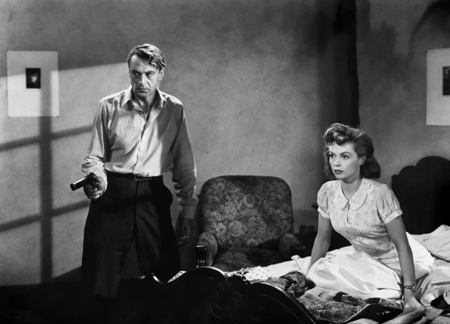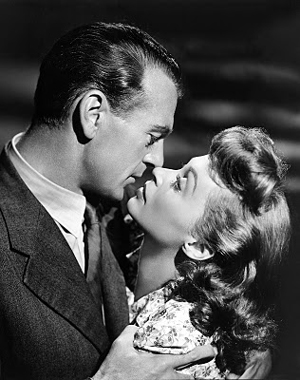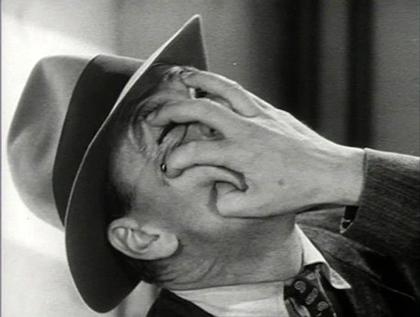
 |
|
|
|
Fritz Lang literally invented the modern spy movie. From Spione to The 1,000 Eyes of Dr. Mabuse, he introduced every kind of double-cross and technological spy gimmick long before the advent of James Bond. His spies of the twenties resemble modern comic book super-criminals, curious mixtures of chivalry and ruthlessness in elaborate theatrical disguises. In WW2, the hero of Lang's Ministry of Fear struggled in a paranoid world of double agents and shifting values. With its immediate comment on the brand-new age of atomic weapons, Lang's Cloak and Dagger was again ahead of everyone else. This film isn't top-rank Fritz Lang but it has one of the most interesting post-production alterations ever done to an American film. Savant believes that its pacifist anti-nuke message was quietly nipped in the bud, censored before it ever reached a movie screen. What happened to Cloak and Dagger makes a compelling case that the government did indeed step in to dictate the content of a motion picture entertainment. A couple of years later, its writers and some of its actors would fall to the onslaught of the HUAC witch hunts. 
The story sees an American physicist become an unlikely secret agent. In the middle of the war, the O.S.S. gets information from inside occupied Europe that the Nazis are trying to build their own atomic bomb. Professor Alvah Jesper (Gary Cooper, seriously miscast) speaks German and knows atomic fission, and is dispatched to Switzerland to contact and sway scientists forced to work on Nazi bomb research. He tries to rescue allied-leaning physicist Katerin Lodor (Helen Thimig), but treacherous Nazi operatives get to her first. Continuing to Italy, Alvah joins a group of partisan agents (which include Robert Alda & Dan Seymour) and poses as a German physicist to spirit key professor Polda (Vladimir Sokoloff) out of the country. Beautiful partisan fighter Gina (Lilli Palmer) helps Alvah hide and wait for his chance, avoiding Polda's Italian Fascist watchdog, Luigi (Marc Lawrence). Cloak and Dagger is an espionage war film released after the victory but made with the same fervor that Lang applied to his earlier Hangmen Also Die! For the first couple of postwar years most American films downplayed war themes, but Lang kept up the fight, using the spy genre to point up a threat even more pressing than Nazi terror. Just as Hangmen Also Die! lauded the suicidal resistance of anti-Fascists, Cloak and Dagger takes on the grim atomic threat issue in leftist terms. The payoff for this theme was removed, but as written by Hollywood leftists Alvah Bessie and Ring Lardner, Jr., the script still pauses for a bold pacifist lecture. Unlikely scientist / man of adventure Gary Cooper:
Cooper's statement about the destructive nature of atomic power belongs in a cautionary science fiction movie: "We can explode the atoms in one apple and destroy a city," says Cooper, "But for all our science, we can't make one apple." He says that atomic power is beyond human control and that its spread has to be stopped. Cooper is speaking of the Nazis but the message is clearly anti-nuke. A year later, MGM's The Beginning or The End would give the development of the atomic bomb a decidedly hawkish, pro-nuke spin. Lang's movie bucks the officially-sanctioned message that the atom would be a clean source of safe energy and that America needed to build bigger and better bombs. Lardner and Maltz plainly state what the government didn't want publicized, that nuclear science is not an American secret somebody else would have to steal if they wished to build a bomb. Technical solutions could be stolen, yes, but not the secret itself. Government propaganda would soon use the leakage of atom secrets to weave tales of Communist spies making off with our patented Golden Fleece. Lang's interest in Cloak and Dagger was clearly this atom theme. He couldn't know that his full message would never make it to the screen. (some spoilers)The Cloak and Dagger that remains is a straight and humorless spy story with some good episodes. Novice operative Alvah Jasper outwits an American double agent in Switzerland (Margaret Hoshelle) but fails in his main purpose, and a good woman dies. Jasper does better in Italy but still comes out with only a middling success -- a team of agents is destroyed. Unlike the best Lang pictures, the film's pacing in this story is off. It begins with far too much talk. When Cooper and Gina hide out in Italy their confinement becomes claustrophobic. The story loses the feeling of context, like a stage-bound television show. 
Cooper's Alvah Jesper character is also a stretch. Without any training, he transforms from an academic into Indiana Jones. It's obvious that you don't send a member of the brain trust on such an unlikely mission, if only because he can be snatched and forced to work for the enemy team. But off Coop goes. Alvah Jesper passes for German in Switzerland but never finds a character -- he coolly blackmails a seasoned spy and then turns into a real softie for the remarkable Lilli Palmer. Just when we're keen on his mission the film leaves the rescue of a scientist's daughter to happen off-screen, and we instead watch the blooming of a new romance. Lang seems more interested in some scenes than others. We don't get much of a feel for Cooper and Palmer's plight. All they really do is hide in a room, a carnival storehouse and under a bridge, all represented by studio sets. The film stalls while waiting for the plot to re-commence. Lilli Palmer is "introduced" in the movie, although she'd been in pictures for years. Her Gina is given some charming business to perform. In a touching scene, she dresses up to re-create the 'pre-war Gina' for Cooper's approval. 1 Robert Alda, Dan Seymour and others make a colorless bunch of partisans, never appearing to be Italian as they chatter away in English. Veteran Vladimir Sokoloff (For Whom the Bell Tolls, The Magnificent Seven) makes a slightly better impression. The most arresting actor is the interesting Helen Thimig (Strangers in the Night) as the sickly scientist Alvah contacts in Switzerland. She unfortunately has only one scene. When Lang is engaged in the material the picture sings. The compromising of an enemy agent is spelled out in a deft series of shots. There's a good, messy fight in the failed rescue attempt at a Swiss chalet. Cooper's fortunes are determined by what seem to be innocuous mistakes, as when Palmer allows sympathy for a housecat to interfere with their mission. Encountering a snoop photographer at an airport (just like James Bond in Jamaica in Dr. No), Cooper avoids having his picture taken, immediately attracting the interest of Gestapo agents. The best scene in the film is a terrific fight that I've discussed elsewhere, an action precursor to Hitchcock's sloppy farmhouse murder in Torn Curtain. Cooper must tangle with Marc Lawrence's menacing Luigi on an Italian street. Palmer distracts Luigi by straightening her stocking, and Cooper muscles him into a doorway for a masterful bout of no-nonsense dirty fighting. Lawrence gouges Cooper's eyes while they struggle for a knife and a gun. Cooper pries Lawrence's fingers apart in an extremely painful-looking shot, and gives him a couple of murderous-looking chops to the throat. All this happens to the sweet tune of an Italian organ grinder outside in the street. It's shockingly violent stuff, and it still gets applause. The scene tops off with a visual reference to Lang's "M" in the form of a bouncing ball, which again seems to symbolizes an absurd fatalism. 
But the most remarkable scene scripted for Cloak and Dagger, the one that would have made it a classic, isn't there. Fritz Lang biographer Lotte Eisner reported that it was the reason Lang made the movie. It was cut and reportedly destroyed before release and cannot be restored. 2 (spoiler)The movie now ends with scientists Cooper and Sokoloff flying away to America, while Gina stays behind to continue the fight. The lovers exchange a lengthy farewell speech just at the time when the takeoff should be hurried. A cut to the airplane's propellers turning over mimics Casablanca, and Max Steiner's music rises to a patriotic climax. It's an unmemorable finish that feels like a wartime morale booster, only three years too late. What was cut is the following: Jesper and Gina's romantic farewell is curtailed by the necessity of taking off right away. In flight, Jesper and an O.S.S. officer tend to professor Polda, who succumbs to his heart ailment. Before he dies he names several secret lab locations where the Nazis are perfecting their atom weapons. Unable to talk, Polda gives them a snapshot photo to represent the last location. Experts identify the landscape in the photo. There follows an Allied commando mission, seen in a montage. Cooper accompanies a hundred paratroops as they storm a fortress high in the Hartz Mountains. But the nuclear research equipment for "weapons of mass destruction" have already been disassembled and moved somewhere else. To Spain? Argentina? The mission comes up empty-handed. 3 The troops rest outside the cave. Cooper quietly contemplates the idea that the genie is now out of the bottle, that the world has been forever changed into a menacing and doom-laden place. He shares a quiet conversation with a homesick paratrooper:
Paratrooper: Nice Sky. And the screenplay ends on a weirdly calm note. The description makes it sound like an expensive and exciting scene, with the troops charging their objective like the swarming cops at the end of White Heat. It would have provided a jarring and perhaps memorable conclusion. Cloak and Dagger is the missing link in the post-war nuke film, made just as national security concerns became the excuse for secrecy and suspicion. I'm willing to believe that Jack Warner or producer Milton Sperling could have independently ordered the re-shoot and re-edit without direct government interference, but the why is unchanged. In his book The Strange Case of Dr. Mabuse David Kalat reports that producer Milton Sperling argued with Lang on the set and though the final scene was ridiculous, because everyone knew the Germans had no ability to make nuclear weapons. That begs the question: why did Sperling okay the script in the first place? And if he did, what changed his mind? Whatever the reason, Fritz Lang's work was altered at the last moment, just as had occurred with his controversial Fury and his uncompromising Hangmen Also Die! 4 Olive Films' Blu-ray of course contains the standard release version of Cloak and Dagger. It is a vast improvement on an Artisan disc from ten years ago, which exhibited severe instability problems due to shrinkage. Olive's HD master is intact and very steady. It is however rather worn, with many tiny scratches and dings in its surface. A carefully applied digital clean-up would probably make the film look nearly perfect. As with most Olive releases, there are no extras. 5
On a scale of Excellent, Good, Fair, and Poor,
Cloak and Dagger Blu-ray rates:
Footnotes:
1. The beautiful, ageless Lilli Palmer returned to play anti-Nazi operatives twenty years later in The Counterfeit Traitor and Operation Crossbow.
2. Eisner, Lotte Fritz Lang, Oxford University Press 1977
3. I can just imagine government officials flipping when hearing Cloak and Dagger's declaration that Argentina and Fascist Spain might harbor Nazi fugitives. In the volatile political climate of 1946, one would think that statement alone could have gotten the film censored. (The German fugitives in Argentina in the noir film Cornered are presented as criminals with Nazi tendencies.)
4. Most censorship in America was of course not governmental, but the result of cautious movie marketing in the face of MPAA 'oversight' and vocal pressure groups. Even now political films are not popular, especially ones with unpleasant messages. This is why so many movie terrorists are really simple criminals in disguise (Die Hard, et. al.). The consensus is that politics and films shouldn't mix. 5. A German opinion on Cloak and Dagger reported in a note from correspondent Aitam Bar Sagi, 6.05.03: Thought you'd like to read this, very interesting: "In the last days of World War II, an American physicist and undercover agent are sent on a mission to free a scientist whom the Nazis are holding captive. In the film the Nazis have successfully developed an atom bomb. However, after Hiroshima and Nagasaki this topic no longer seemed so opportune. Against Lang's will, the studio changed the ending. Lang had wanted his hero to discover the deserted facilities where the bomb had been developed, a center of Nazi power in a mountain bunker, as well as a camp with the corpses of thousands of slave laborers whom the Nazis had murdered before they fled. This ending was to insinuate that the Nazis had succeeded in moving their laboratories and scientific formulas for the bomb to a secure location. In other words the threat of Nazi terror continued. The film was to close with hero's disillusioned words: "God have mercy on us if we think we can keep science a secret! God have mercy on us if we think we can wage other wars without destroying ourselves." From- FL: Fritz Lang. His Life and Work. Photographs and Documents 2001 by Filmmuseum Berlin - Deutsche Kinemathek and Jovis Verlag Gmbh. 6. A note from Marshall Deutelbaum, 6.05.03: Dear Glenn Erickson, if you read French, you might like to read script excerpts from the missing final reel. They appear in Fritz Lang: La mise en scene edited by Bernard Eisenschitz and Paolo Bertetto, published in Turin in 1995 by Lindau. The book inventories everything Lang left to the Cinematheque Francaise and has an essay about each film. Noel Simsolo wrote the one for Cloak and Dagger titled Cloak and Dagger: La Fin Coupee (C & D: The Cut Ending) on pp. 301-311. He says the final sequence runs 13 pages and consists of 35 shots (nos. 218-253). He says Lang shot the scenes. Two stills from this part of the script appear in the essay. Simsolo reproduces the script for shots no. 220-231 where the German site is figured out and plans are made to parachute in, and shots 251-253, in which the characters survey the site and realize that the Germans have moved all of their bomb-making facilities somewhere else and remain a threat. The intervening shots are summarized. Simsolo suggests the pacifist ending was cut because of the beginning of the Cold War: "Scarcely had the peace been signed that the enemy was no longer the Nazis, but the Reds. And since the power of the atomic bomb theoretically gave the United States superiority over the Eastern Bloc, it was no longer appropriate to question its use or to speak of peace. In the Cold War a pacifist message was no longer the order of the day. Cloak and Dagger had to become a simple anti-Nazi spy film." (309--my poor translation.)
As always, I find your reviews insightful and fascinating. -- Marshall Deutelbaum
Reviews on the Savant main site have additional credits information and are often updated and annotated with footnotes, reader input and graphics.
Review Staff | About DVD Talk | Newsletter Subscribe | Join DVD Talk Forum |
| ||||||||||||||||||